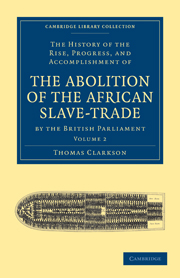Summary
The defeat which we had just sustained, was a matter of great triumph to our opponents. When they considered the majority in the House of Commons in their favour, they viewed the resolutions of the committee, which have been detailed, as the last spiteful effort of a vanquished and dying animal, and they supposed that they had consigned the question to eternal sleep. The committee, however, were too deeply attached to the cause, vanquished as they were, to desert it; and they knew also too well the barometer of public feeling, and the occasion of its fluctuations, to despair. In the year 1787 the members of the House of Commons, as well as the people, were enthusiastic in behalf of the abolition of the trade. In the year 1788 the fair enthusiasm of the former began to fade. In 1789 it died. In 1790 prejudice started up as a noxious weed in its place. In 1791 this prejudice arrived at its growth. But to what were these changes owing?—To delay; during which the mind, having been gradually led to the question as a commercial, had been gradually taken from it as a moral object. But it was possible to restore the mind to its proper place. Add to which, that the nation had never deserted the cause during this whole period. It is much to the honour of the English people, that they should have continued to feel for the existence of an evil which was so far removed from their sight.
- Type
- Chapter
- Information
- The History of the Rise, Progress, and Accomplishment of the Abolition of the African Slave-Trade by the British Parliament , pp. 346 - 460Publisher: Cambridge University PressPrint publication year: 2010First published in: 1808

